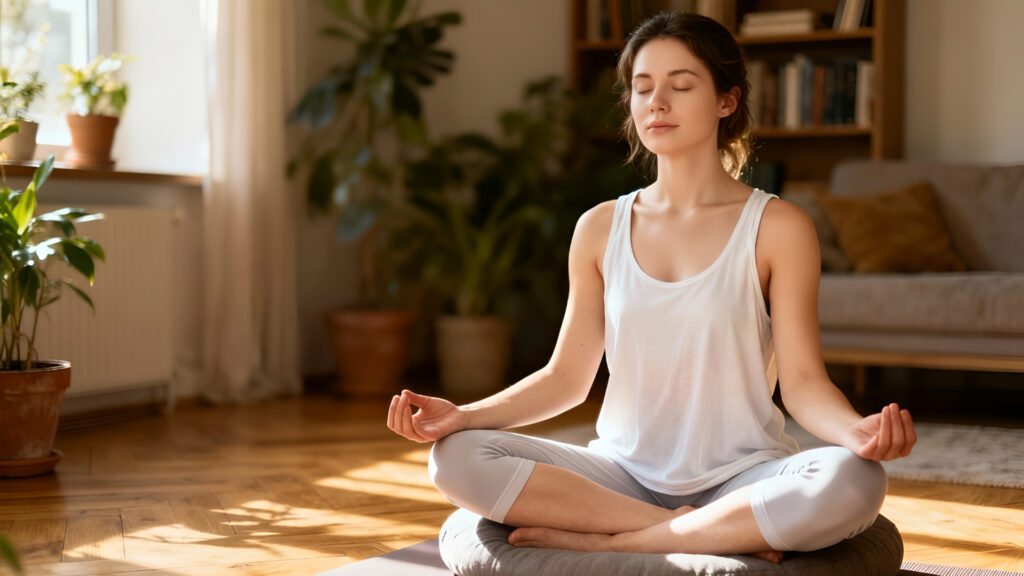Meditation and mindfulness come from ancient traditions like Hindu and Buddhist. Now, they’re used for health and well-being. Mindfulness is about focusing on the present moment without judgment. Meditation helps improve attention, emotional awareness, and calmness.
The main goals of meditation are clear. It aims to reduce stress, increase calm, and improve focus. It also helps in being more compassionate and less reactive in tough situations.
In daily life, meditation can take many forms. Some meditate for just a few minutes each day. Others bring mindfulness to walking, eating, or work. Starting small helps build a consistent habit.
Many start with meditation classes at universities or hospitals. They begin with simple practices like breathing or body scans. Meditation can fit into any schedule and doesn’t need special equipment.

Meditation and Mindfulness: Benefits of Practice for Daily Life
Studies show meditation can help a lot. It can lessen stress and worry. It also helps with irritable bowel syndrome, post-traumatic stress disorder, and fibromyalgia.
Meditation can also reduce anxiety and depression. It makes people less likely to fall back into depression. It helps them deal with anxiety every day.
It can also improve sleep. People fall asleep faster and sleep better. It helps with chronic pain too, making pain feel less and emotions easier to handle.
Meditation has numerous benefits, including a positive impact on heart health. It helps lower blood pressure both during and after meditation, which can contribute to the overall well-being of the heart and blood vessels.
It makes the mind sharper. Attention, memory, and mental clarity improve with practice. Older adults see less cognitive decline and stay focused better.
It also makes people kinder and more positive. They react less to stress. This leads to mental balance and less stress.
Many studies back these benefits. They show meditation helps with stress, anxiety, pain, depression, insomnia, and high blood pressure. It might even help with asthma and fibromyalgia, but more research is needed.
Consistency is key. Even a few minutes a day can make a difference. But, most programs use daily practice for weeks to see lasting changes.
How Meditation and Mindfulness Work: Mechanisms and Research Evidence
Meditation and mindfulness change how we pay attention, feel emotions, and notice our body signals. They also help us form new habits. Scientists study how these practices alter our brains and behaviors. They’ve found key ways these practices lead to real changes in our lives.
Attention training and focus
Practices like focusing on the breath help us stay focused. When our minds wander, we gently bring our attention back. This strengthens our ability to concentrate.
Studies show that regular practice improves our attention span. We become less easily distracted. People perform better on tasks that require staying focused.
Emotion regulation and reduced reactivity
Mindfulness teaches us to observe our thoughts and feelings without judgment. It helps us see them as passing thoughts, not as reality. This way, we react less impulsively to upsetting things.
Research shows that mindfulness reduces anxiety and depression. It helps people avoid relapsing into depression. These benefits match changes in brain areas that control emotions.
Physiological markers and physical health
Meditation can lower heart rate and blood pressure during sessions. Regular practice may also improve sleep and blood pressure levels. These changes show meditation’s impact on our body.
Studies find that meditation reduces stress hormones and inflammation. A review and meta-analysis confirm these benefits for stress, sleep, and blood pressure. Meditation may also help with conditions like IBS and chronic pain, though results vary.
Behavioral changes and habit formation
Mindfulness helps us notice and change bad habits, like emotional eating. It increases body awareness, helping us feel full sooner. This makes healthy choices, like exercise, more rewarding.
Combining mindfulness with behavior change improves self-control. Long-term studies show that mindfulness supports lasting changes in diet, activity, and sleep habits.
Practical Meditation Techniques and How to Build a Daily Practice
To start a daily routine, begin with small steps. Find a quiet spot and set a timer for 5 to 10 minutes. Sit comfortably with your back straight, feet flat, and hands in your lap.
Close your eyes or soften your gaze. Focus on your breath. This simple seated practice trains your attention.
Simple seated meditation often uses focused-attention breathing. Pay attention to how your body expands or feels at your nostrils. If your mind drifts, gently bring it back to your breath.
Breathing practices can vary. Try counting your breath or simply observe its natural rhythm. These small steps make meditation feel achievable, even on busy days.
Simple seated and breathing practices
Start with a short timer to avoid feeling overwhelmed. Use a cushion or chair for support. Let your breathing guide your attention.
If you feel restless, shorten your session. Regular, brief sessions help build a meditation habit.
Mindfulness exercises for everyday life
Body scan meditation invites you to focus on your body from toes to head. You can lie down or sit and slowly move your attention through your body. This practice increases body awareness and helps release stress.
Walking meditation involves walking a short path. Focus on your posture, balance, and the sensations in your legs and feet. Use mindful steps during walks to incorporate meditation into your daily routine.
Even small moments can be mindful. Mindful eating enhances your experience of taste, texture, and smell. A few minutes of focused breathing can also reset your attention during a busy day.
Guided meditations, apps, and formal programs
Guided meditations are great for both beginners and experienced meditators. Many universities and medical centers offer evidence-based resources. Look for programs backed by research, like Mindfulness-Based Stress Reduction.
A mobile app can help you stay consistent. Choose apps that reference clinical studies or university programs. For deeper learning, consider an eight-week formal meditation course used in research.
Adapting practice for health conditions and different populations
Mindfulness can be adapted for various health conditions. For chronic pain, try shorter sits and movement-based sessions. For PTSD, work with trained clinicians or use trauma-sensitive meditation programs.
Older adults or those with mobility issues can benefit from walking meditation, gentle yoga, or guided audio. Professionals tailor practices to individual needs. Research supports mindfulness for substance use, binge eating, and high blood pressure, allowing clinicians to adapt programs for specific health goals.
Conclusion
Meditation and mindfulness are practices that have been around for a long time. They are also backed by modern science. Studies show they can help lower stress, blood pressure, and chronic pain. They also improve sleep, attention, memory, and emotional control.
Starting is easy. Just a few minutes a day can make a difference. You can add meditation to your daily activities, like walking or eating mindfully. There are also guided programs and apps from trusted sources to help you.
Being patient is key. It may take weeks or months to see results. So, start small and be consistent. For serious issues like PTSD or depression, look for evidence-based programs or qualified teachers.
Try a simple habit to begin. Spend five minutes each morning on focused breathing. This helps you stay in the present and find calm. Then, look for guided resources and local programs to deepen your practice and improve your well-being over time.
 Ramon Mascarenas is the owner of PalmLeaf Massage & Wellness. Jen Mascarenas is his wife and a vegan who believes in a whole-food, plant-based diet to promote vitality. She shares vegan recipes and writes abstract research articles for PalmLeaf Massage & Wellness. Ramon Mascarenas and his associates have licensed massage therapists who practice Myofascial Trigger Point Therapy and other medical massage modalities. Their services expanded along with Acupuncture, Chiropractic Care and Cryo Body Sculpting to promote wellness and help clients with pain management through self-care exercises.
Ramon Mascarenas is the owner of PalmLeaf Massage & Wellness. Jen Mascarenas is his wife and a vegan who believes in a whole-food, plant-based diet to promote vitality. She shares vegan recipes and writes abstract research articles for PalmLeaf Massage & Wellness. Ramon Mascarenas and his associates have licensed massage therapists who practice Myofascial Trigger Point Therapy and other medical massage modalities. Their services expanded along with Acupuncture, Chiropractic Care and Cryo Body Sculpting to promote wellness and help clients with pain management through self-care exercises.
Book now at https://palmleafmassage.com. If you have any questions, please call us at 847.961.4800





